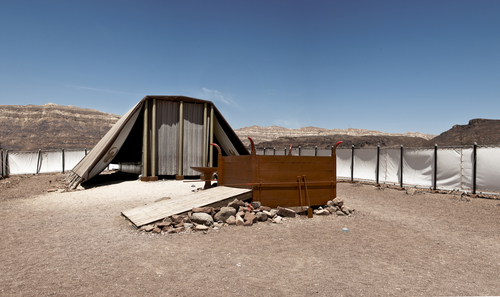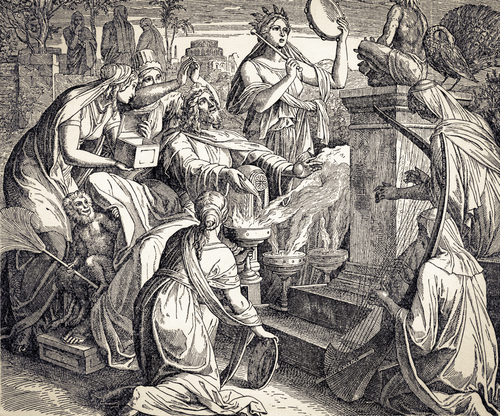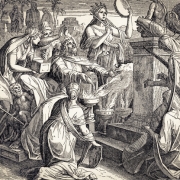Rejecting God’s Altar
/1 Comment/in Weekly Devotional/by David GuzikNow King Ahaz went to Damascus to meet Tiglath-Pileser king of Assyria, and saw an altar that was at Damascus; and King Ahaz sent to Urijah the priest the design of the altar and its pattern, according to all its workmanship. Then Urijah the priest built an altar according to all that King Ahaz had sent from Damascus. So Urijah the priest made it before King Ahaz came back from Damascus. (2 Kings 16:10-11)
King Ahaz decided he would rather surrender to the king of Assyria than to the King of Kings. He rejected God and looked to the pagan ruler for help. So, it wasn’t strange that he decided to visit Tiglath-Pileser and make official his submission to the king of Assyria.

When he was there, Ahaz saw something that pleased him: he saw an altar that was set at Damascus. He liked it so much that King Ahaz sent to Urijah the priest the design of the altar and its pattern. Using the plans sent from Ahaz, Urijah imitated the pagan altar at Damascus and had it ready by the time Ahaz returned from Damascus. Ahaz did this both to please his new master, Tiglath-Pileser, and to bring the latest trends in altar design to God’s temple in Jerusalem.
2 Chronicles 28:23 explains why King Ahaz was attracted to what he saw in Damascus: For he sacrificed to the gods of Damascus which had defeated him, saying, “Because the gods of the kings of Syria help them, I will sacrifice to them that they may help me.” But they were the ruin of him and of all Israel.
Think of it: a king over the people of God actually set up a pagan altar at the temple in Jerusalem. He did it because he knew it would please the pagans, because he liked the fashionable design of the altar, and because he thought it would bring him success.
Doesn’t that sound like a lot of churches today? Many church leaders today put their trust in the tools, the techniques, and the principles of worldly success. They think the gods of Damascus will give them victory. We want to please the world as Ahaz wanted to please the king of Assyria. We are impressed with the fashionable designs of what comes from the world. We think imitating the world will bring us success. It’s sad when the church goes to the world for its methods and principles.
The sin of Ahaz didn’t end with Ahaz. We read, Urijah the priest built an altar. Of course, Ahaz bore the greater blame in this matter, but the high priest Urijah was also at fault. Together, they brought in something that was their ruin and the ruin of Israel.
That’s the problem with the kind of compromise Ahaz allowed and promoted. Like Jesus warned, it is like leaven or yeast spreading through a whole lump of bread dough. Let’s look to the LORD more, and to the world less!
Come Up and Save Me
/0 Comments/in Weekly Devotional/by David GuzikSo Ahaz sent messengers to Tiglath-Pileser king of Assyria, saying, “I am your servant and your son. Come up and save me from the hand of the king of Syria and from the hand of the king of Israel, who rise up against me.” And Ahaz took the silver and gold that was found in the house of the LORD, and in the treasuries of the king’s house, and sent it as a present to the king of Assyria. (2 Kings 16:7-8)
King Ahaz of Judah saw the combined armies of Syria and Israel come against him, and in a panic, he begged the king of Assyria for help. Ahaz did this, even though Isaiah offered him a sign for assurance of God’s help in the struggle against the combined armies of Israel and Syria (Isaiah 7:1-12). Sadly, Ahaz refused under the excuse of not wanting to test God, when he really wanted to trust the king of Assyria.

Ahaz said to the pagan king: “I am your servant and your son. Come up and save me.” It is sad to see a king over God’s people bow down to a pagan king. Ahaz surrendered to one enemy in order to defeat another. He refused to trust in the God of Israel and instead put his trust in an enemy of Israel.
It wasn’t enough for Ahaz to bow down to the king of Assyria. Next, Ahaz took the silver and gold that was found in the house of the LORD, and in the treasuries of the king’s house, and sent it as a present to the king of Assyria. Essentially, Ahaz made Judah a subject kingdom to Assyria. Ahaz now took his orders from the Assyrian king, and he sacrificed the independence of the kingdom of Judah.
Imagine the blessing that would have come if Ahaz had surrendered and sacrificed to the LORD with the same energy and heart that he surrendered to the Assyrian king. Ahaz was willing to trust in and humble himself before a pagan king, but not before the God of Israel.
What a contrast this was to Ahaz’s royal ancestor, David. David said, “In my distress I called upon the LORD, and cried out to my God” (Psalm 18:6). We all have a choice in a crisis. We can trust things set against God, or we can trust God. In the case of Ahaz, his surrender to the king of Assyria worked in the short term but was a disaster in the long term. His wrong choice was bad for him and for Judah.
Yet, look for something good in this. When anyone cries out to God saying, “I am your servant and your son. Come up and save me,” then God will answer. Appeal to God on the basis of your service to Him, and His adoption of you – then humbly ask Him to rescue you. God loves to respond to those who surrender to Him and to His will.
Promises Made and Received
/0 Comments/in Weekly Devotional/by David GuzikThen Rezin king of Syria and Pekah the son of Remaliah, king of Israel, came up to Jerusalem to make war; and they besieged Ahaz but could not overcome him. (2 Kings 16:5)
At the time of 2 Kings 16, the 12 tribes of Israel were divided into two kingdoms for more than 200 years. They always seemed to compete with each other, and sometimes they made war. Here, we see the ten northern tribes led by Pekah, the king of Israel, attacking the two southern tribes of the kingdom of Judah, led by Ahaz.

The king of Israel was afraid of the rising Assyrian Empire, and hoped that attacking Judah would make them stronger against Assyria. In Isaiah 7:6 we learn that the real goal of this attack was to remove Ahaz and to set up another king over Judah.
We know from 2 Chronicles 28:5-8 that on the whole, Judah suffered terrible losses from this attack. King Ahaz lost 120,000 Judean soldiers and 200,000 civilian hostages in these battles with Israel and Syria. It was a dark time for Judah, and it looked as if the dynasty of David would soon be extinguished, as happened so many times with the ruling dynasties of Israel.
Yet, they did not defeat Judah. They besieged Ahaz but could not overcome him. The armies of Syria and Israel were strong enough to capture many cities of Judah, but not strong enough to defeat Jerusalem and overthrow the government of Ahaz.
Do you remember the remarkable Messianic prophecy of Isaiah 7? There, God promised: Behold, the virgin shall conceive and bear a Son, and shall call His name Immanuel. That prophecy of Isaiah 7 – including the announcement of the Immanuel sign – came from Isaiah to King Ahaz during this invasion from Israel and Syria. Despite this promise, Ahaz refused to trust in the LORD and instead put his trust in the king of Assyria. Yet for the sake of David, God did not allow this disastrous attack on Judah to prevail. He would not allow this Satanic plot against the Messianic dynasty of David to succeed.
These great promises really didn’t bring King Ahaz much peace, because he didn’t believe them. The promises of God do us little good if we don’t believe them. Even when God is faithful to the promises and rescues us (like He did Ahaz and Judah), we don’t enjoy the peace and comfort we could have if we only believed.
What promise of God do you need to believe today? God promises peace to those who give their attention to Him (Isaiah 26:3). God promises release from anxiety in prayer (Philippians 4:6-7). God promises abundant life in Jesus Christ (John 10:10). God promises forgiveness when we confess and repent of our sins (1 John 1:9).
There are many, many more precious promises of God – but they only do us real benefit as we believe them and receive them.
Choosing Bad Examples
/1 Comment/in Weekly Devotional/by David GuzikBut he walked in the way of the kings of Israel; indeed he made his son pass through the fire, according to the abominations of the nations whom the LORD had cast out from before the children of Israel. And he sacrificed and burned incense on the high places, on the hills, and under every green tree. (2 Kings 16:2-3)
2 Kings 16 begins by telling us about the reign of Ahaz, who was the son of a good king (Jotham) and the grandson of a better king (Uzziah). Yet, for some reason, Ahaz refused to walk in the example of his father and grandfather. Instead, he walked in the way of the kings of Israel.

Ahaz had plenty of good examples, but he embraced the ungodly ways of the northern tribes. The southern tribes of the Kingdom of Judah had a mixture of godly and ungodly kings; the Kingdom of Israel had onlyungodly kings, and Ahaz followed their pattern. This is the first time we see Judah imitating Israel’s apostasy.
It was so bad that King Ahaz made his son pass through the fire. This describes Ahaz’s participation in the worship of Molech, a pagan god. Molech was honored by heating a metal statue representing the god until it was red hot. They then placed a living infant on the outstretched hands of the statue, while beating drums drowned out the screams of the child until it burned to death.
I know that is a terrible thing to read, and I almost sorry to write it. But it’s important to know how evil Ahaz was, and how sad it was that he rejected the good examples of his father and grandfather and embraced the evil of the norther kingdom.
Long before, God pronounced the death sentence against all who worshipped Molech, saying: I will set My face against that man, and will cut him off from his people, because he has given some of his descendants to Molech, to defile My sanctuary and profane My holy name (Leviticus 20:3).
One of the great crimes of the northern tribes of Israel was their worship of Molech, and it led to the Assyrian conquest (2 Kings 17:17). King Manasseh of Judah gave his son to Molech (2 Kings 21:6). Up to the days of King Josiah of Judah, Molech worship continued, because he destroyed a place of worship to that idol (2 Kings 23:10).
In imitating the ways of the northern tribes, Ahaz really imitated the ways of the Canaanites. All this was according to the abominations of the nations whom the LORD had cast out from before the children of Israel. The Canaanite nations that occupied Canaan before the time of Joshua also practiced this terrible form of human and child sacrifice. God would judge Judah for their continued practice of these sins.
It all began with a man following a bad example. What examples will you choose to follow? Ask God for the wisdom and strength to follow the best examples.






